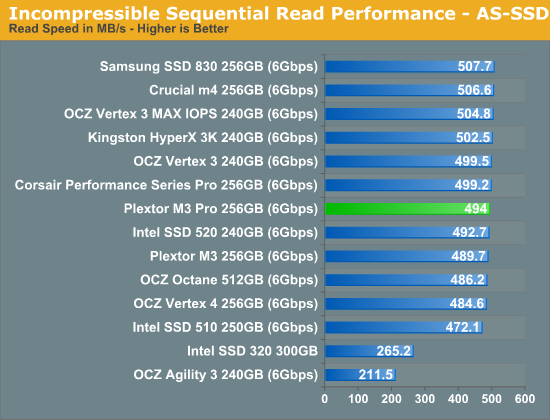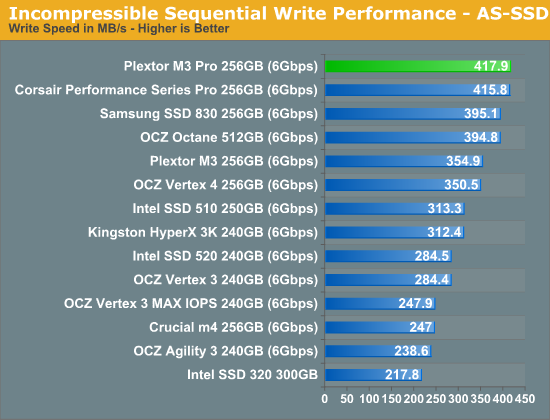Plextor M3 Pro (256GB) Review
by Kristian Vättö on July 1, 2012 1:45 PM ESTAS-SSD Incompressible Sequential Performance
The AS-SSD sequential benchmark uses incompressible data for all of its transfers. The result is a pretty big reduction in sequential write speed on SandForce based controllers, while other drives continue to work at roughly the same speed as with compressible data.

As I've said before, incompressible sequential read speed testing is very unsurprising nowadays to say the least, and the M3 Pro doesn't make an exception. It's 4.3MB/s (0.9%) faster than the M3 but when that is translated into percentages, we're essentially within the margin of error.

Incompressible sequential write performance, on the other hand, is another story. The M3 Pro comes out as the fastest drive we have tested, although it beats Corsair Performance Series Pro by only 2.1MB/s. However, the difference between the M3 and M3 Pro is 63MB/s (~18%), which is fairly significant.










55 Comments
View All Comments
NCM - Monday, July 2, 2012 - link
Three things I forgot to include in my post above:- The Plextor needs to be reformatted for the Mac. You use Apple's Disk Utility to handle that, as with any other drive.
- Cloning the original drive using DU's Restore function will also automatically clone Lion's hidden Recovery partition.
- Absolute SSD performance is limited by my 2010 MBP's 3 Gb/s SATA interface, so I could have bought a cheaper last generation drive. However I hope to be keeping this pricey SSD long enough for it to see at least one more host computer, and that will support faster transfers.
Belard - Monday, July 2, 2012 - link
Pretty much ALL new SSDs are SATA3.0 / 6GB/s... so its not really an issue.Its older tech or mix tech models that are SATA2.
Kristian Vättö - Monday, July 2, 2012 - link
Not with the regular updater at least. In theory, someone could modify the installer and make it possible though.Kyanzes - Monday, July 2, 2012 - link
"relatively unknown brand" :)Okay.
bobsmith1492 - Monday, July 2, 2012 - link
Yes they are relatively unknown. Yes they used to be more well-known but only for optical drives.eanazag - Monday, July 2, 2012 - link
I would like to see a 2.5" HDD at 5400 rpm and 7200 rpm sample data for a baseline included in the reviews. I don't care if they ever get updated after that. I would just like to be able to quickly see where the mechanical drives chime in.Performance would data would be icing, but power data is nice.
If I upgrade my users to a drive off this list, which is very likely. I'd like to be able to tell them if they are going to take a hit on battery life or a boost.
Belard - Monday, July 2, 2012 - link
They stopped doing that some time ago because it messes up the charts somewhat. Basically, they just don't compare... and that was before the SATA 6Gbps drives came out.Here is a early 2011 review with a WD VelociRaptor (The fastest HD money can buy for a consumer drive). And yet, its a sliver. Only SSDs that perform almost as slow are the bottom end SSD. And keep in mind, the Raptors are 2-3 times faster than a 5400RPM drive.
http://www.anandtech.com/show/4346/ocz-agility-3-2...
RANDOM READ (MB/s)
00.68 = Raptor
58.10 = Intel X25-M G2 (still a very good drive)
93.50 = Crucial C300 (early 6Gbps drives)
Sequential READ (MB/s)
145.30 = Raptor
226.30 = Intel X25-M G2 (still a very good drive)
307.20 = Crucial C300 (early 6Gbps drives)
392.20 = Intel 510 SSD (6Gbps)
A modern high end SSD is about 100x faster in random R / W operations over any HD.
Oh, here is a GOOD older 2010 review which includes a Seagate 5400 RPM 2.5" drive. OUCH!
http://www.anandtech.com/show/3690/the-impact-of-s...
See how the chart becomes somewhat meaningless? And thats with 3Gbps drives!
Imagine looking at a chart comparing a 16mhz 286 to a quad core 3400mhz i5 CPU.
hechacker1 - Monday, July 2, 2012 - link
Probably, assuming there isn't some checksum that can't be cracked to flash the drive.In my experience, almost all drive firmwares can be flashed.
sulu1977 - Monday, July 2, 2012 - link
Speed and performance of such a device is important, but not as important as reliability. Reliability is hands down my top priority. Just wanted to mention this.octoploid - Tuesday, July 3, 2012 - link
There is already an unofficial tool available that can transform a normal M3 into an M3-Pro:http://bbs.pceva.com.cn/thread-47279-1-1.html